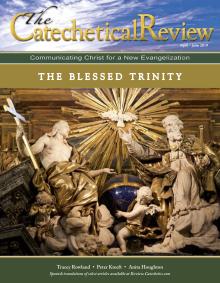As catechists, we often shy away from teaching the Trinity. Perhaps we imagine that our audience will not be able to understand; or, perhaps we doubt whether we are capable of teaching adequately on this great mystery. And so, the Trinity can appear in the curriculum as a burdensome lesson plan that needs to be addressed and, thank goodness, when the lesson plan is over, we can move on to catechizing on “easier” aspects of the faith. The goal of this article is to offer a challenge and a consolation in regard to catechesis, curriculum, and the Trinity. The challenge is that the Trinity is not merely a particular “topic” that needs to be covered every so often. Rather, the Blessed Trinity is the topic—the foundational reality and source of unity—which must be addressed in every catechesis. The consolation is that the Catechism of the Catholic Church has been written in such a way so as to draw our attention, clearly and consistently, to the trinitarian unity of the faith. In other words, the Trinity is the source of unity for the whole curriculum and for the whole of our precious faith. The Catechism gently reminds us of this fact at every turn. Trinity as Source of Unity One of the great challenges of catechesis is to present the faith as a whole—as a coherent unity. Unfortunately, it is far too common for the articles of faith to be perceived not as a whole, but rather as mere isolated bits of information, or disparate facts to be remembered. For example, there are seven sacraments, ten commandments, and a partridge in a pear tree, etc.; and somehow, we imagine that if we could simply keep all these lists straight, we would thereby understand the faith. In truth, we only understand the faith when we perceive how all of these aspects of Divine Revelation form a unity. What, then, is the source of this unity? The Blessed Trinity! Listen to the Catechism on this very point. The mystery of the Most Holy Trinity is the central mystery of Christian faith and life. It is the mystery of God in himself. It is therefore the source of all the other mysteries of faith, the light that enlightens them. It is the most fundamental and essential teaching in the “hierarchy of the truths of the faith.”[1] The phrase “hierarchy of truths” is taken from the Second Vatican Council’s Decree on Ecumenism, and it is further explained in the General Directory for Catechesis, which notes that “some truths are based upon others as a matter of priority and are illumined by them.”[2] In other words, the Blessed Trinity is the basis of every truth, and the light that illuminates and unites every aspect of our faith. This makes eminent sense. After all, we come from the Trinity; in God’s great mercy, we may hope to spend eternity in the life and love of the Trinity; therefore, every aspect of this present life really only matters—only makes sense—in light of the Blessed Trinity. Our job as catechists is to craft every catechesis with this key truth in mind. Whatever topic or doctrine we are discussing, we want to draw attention to the manner in which the Trinity illuminates it.
The rest of this online article is available for current Guild members.
This article is from The Catechetical Review (Online Edition ISSN 2379-6324) and may be copied for catechetical purposes only. It may not be reprinted in another published work without the permission of The Catechetical Review by contacting [email protected]
Articles from the Most Recent Issue
Free Mary’s Motherhood: A Healing Balm in Our Modern Times
Free The Eucharist and Our Call to Mission
The Passover and the Eucharist as Redemptive Sacrifices
- ‹ sebelumnya
- 2 dari 6
- selanjutnya ›



